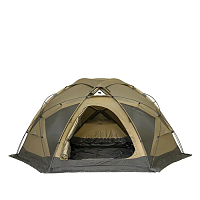Cart
Top Stove Pipe Materials You Need to Know About
Introduction:
When it comes to tent stoves and outdoor cooking, stovepipes play a crucial role in safely venting smoke and gases out of the camping area. Choosing the right stovepipe material is essential for efficient heat transfer and durability. In this comprehensive review, we will explore the top stove pipe materials used in tent stoves, highlighting their features, benefits, and considerations. By understanding the different options available, you can make an informed decision and enhance your outdoor cooking experience.
Section 1: Stainless Steel Stove Pipes
- Considerations: While stainless steel stove pipes offer excellent performance, they tend to be more expensive than other materials. Additionally, they may require periodic cleaning to remove soot buildup, which can affect their heat transfer efficiency.
Section 2: Galvanized Steel Stove Pipes
- Considerations: Over time, the zinc coating on galvanized steel stove pipes can deteriorate, especially when exposed to high temperatures. This can lead to rust and reduced performance. It is important to regularly inspect and maintain galvanized steel pipes to ensure their longevity and safety.
Section 3: Double-Walled Stove Pipes
- Considerations: Double-walled stove pipes tend to be more expensive than single-walled options. They also require more space due to their increased diameter. However, the enhanced safety and improved heat retention make them a worthwhile investment for those prioritizing safety and efficiency.
Section 4: Titanium Stove Pipes
- Considerations: Titanium stove pipes are generally more expensive than other materials. However, their exceptional durability and lightweight nature make them a popular choice among backpackers and long-term campers who prioritize weight savings and durability.
Section 5: Ceramic Fiber Insulated Stove Pipes
- Considerations: Ceramic fiber insulated stove pipes are typically more expensive than standard stove pipes. They require careful handling to prevent damage to the insulation layer. It is important to follow the manufacturer's instructions for installation and maintenance to ensure proper performance.
Conclusion:
- Contact Us
-

About Pomoly
Pomoly is a leading camping brand specializing in hot tents and tent stoves. We are camping life explorer, Follow Page / Join Group, let's make camping enjoyful together!
Working Hours
Mon-Fri, 09:00 - 17:00

- Company Info
- NEWS
- About us
- Pomoly Name
- Leave-No-Trace
- Contact Now
- Facebook Group
- YouTube Learning
- Product News
- Contact Us
- Topic Collections
- Policies & Terms
- Payment Policy
- Shipping Policy
- Return & Refund
- Privacy Policy
- Terms of Use
- Tax Policy
- Website Disclaimer
- Safety Disclaimer
- Warranty Policy
- Promotion Policy
- Pre-order Policy
- INTELLECTUAL PROPERTY RIGHTS
- Dealers Agreement And Terms
- Become Affiliate
- User Center
- Forget Password
- My Orders
- Tracking Order
- My Account
- Register
- Popular Searches
-
Tipi Tents Dome Tents Camping Tent Hammock Stove Camping Camping Pellet Stove Circle 6 Titanium Water TankDome X Locomotive 20 LEO 2 camping tent T-Brick 2.0 T1 2.0 tent stove Dweller wood stove Oroqen 2.0 Chimney Water Tank Lumberjack STOVEHUT Bromance 70 Tipi Pomoly Coupon Baker Oven Stove Titanium elbow Fire Pits Tent Stove titanium Stove Outdoor Pellet Stove
keebon pellet stove






